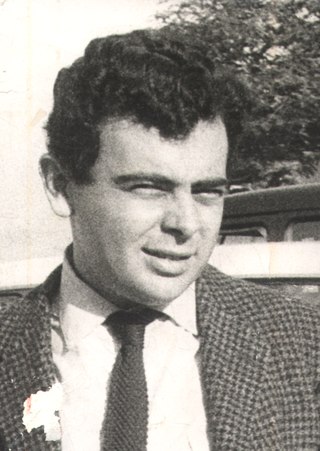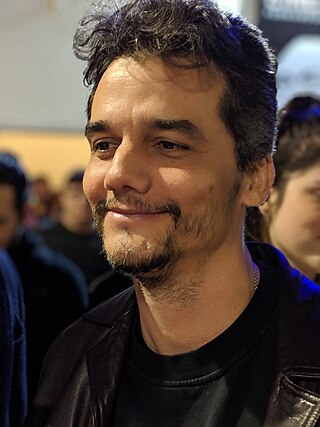A list of films produced in Brazil in 2008 (see 2008 in film):
A list of films produced in Brazil in 2008 (see 2008 in film):

Brazil, officially the Federative Republic of Brazil, is the largest and easternmost country in South America and Latin America. Brazil is the world's fifth-largest country by area and the seventh most populous. Its capital is Brasília, and its most populous city is São Paulo. Brazil is a federation composed of 26 states and a Federal District. It is the only country in the Americas where Portuguese is an official language. Brazil is among the world's most multicultural and ethnically diverse nations, due to over a century of mass immigration from around the world.

Paulo Coelho de Souza is a Brazilian lyricist and novelist and a member of the Brazilian Academy of Letters since 2002. His 1988 novel The Alchemist was an international best-seller.

Brazil is a 1985 dystopian science-fiction black comedy film directed by Terry Gilliam and written by Gilliam, Charles McKeown, and Tom Stoppard. The film stars Jonathan Pryce and features Robert De Niro, Kim Greist, Michael Palin, Katherine Helmond, Bob Hoskins, and Ian Holm.

Saludos Amigos is a 1942 American live-action/animated propaganda anthology film produced by Walt Disney and released by RKO Radio Pictures. Set in Latin America, it is made up of four different segments; Donald Duck stars in two of them and Goofy stars in one. It also features the first appearance of José Carioca, the malandro Brazilian parrot. Saludos Amigos premiered in Rio de Janeiro on August 24, 1942. It was released in the United States on February 6, 1943.
2005 in film is an overview of events, including the highest-grossing films, award ceremonies, festivals, a list of country-specific lists of films released, notable deaths and film debuts.

The culture of Brazil has been shaped by the amalgamation of diverse indigenous cultures, and the cultural fusion that took place among Indigenous communities, Portuguese colonizers, and Africans, primarily during the Brazilian colonial period. In the late 19th and early 20th centuries, Brazil received a significant number of immigrants, primarily of Portuguese, Italian, Spanish, and German origin, which along with smaller numbers of Austrians, Arabs, Japanese, Poles, Ukrainians, Russians, Greeks, Chinese, and Koreans gave a relevant contribution to the formation of regional cultures in Brazil, and thus contributed to its current existence as a plural and racially diverse society.

City of God is a 2002 Brazilian epic crime film directed by Fernando Meirelles and Kátia Lund. Bráulio Mantovani's script is adapted from the 1997 novel of the same name written by Paulo Lins, but the plot is also loosely based on real events. It depicts the growth of organized crime in the Cidade de Deus suburb of Rio de Janeiro, between the end of the 1960s and the beginning of the 1980s, with the film's closure depicting the war between the drug dealer Li'l Zé and vigilante-turned-criminal Knockout Ned. The tagline is "If you run, the beast catches you; if you stay, the beast eats you."

Glauber de Andrade Rocha was a Brazilian film director, actor and screenwriter. He was one of the most influential moviemakers of Brazilian cinema and a key figure of Cinema Novo. His films Black God, White Devil and Entranced Earth are often considered to be two of the greatest achievements in Brazilian cinematic history, being selected by Abraccine as, respectively, the second and fifth best Brazilian films of all-time. Rocha also the distinction of having the most films on Abraccine's list: 5 films.

Black Orpheus is a 1959 romantic tragedy film directed by French filmmaker Marcel Camus and starring Marpessa Dawn and Breno Mello. It is based on the play Orfeu da Conceição by Vinicius de Moraes, which set the Greek legend of Orpheus and Eurydice in a contemporary favela in Rio de Janeiro during Carnaval. The film was an international co-production among companies in Brazil, France and Italy.
The year 2008 involved many major film events. The Dark Knight was the year's highest-grossing film, while Slumdog Millionaire won the Academy Award for Best Picture.

Brazilian cinema was introduced early in the 20th century but took some time to consolidate itself as a popular form of entertainment. The film industry of Brazil has gone through periods of ups and downs, a reflection of its dependency on state funding and incentives.
A list of films produced in Brazil ordered by year and split onto separate pages by decade. For an alphabetical list of films currently on Wikipedia see Category:Brazilian films

Wagner Maniçoba de Moura is a Brazilian actor, director and filmmaker. Wagner started his career doing theater in Salvador, where he worked with renowned directors, and soon scored some appearances in films. In 2003, he got his first leading roles in movies, in addition to having a prominent role in Carandiru, which propelled him to the main scene of Brazilian cinema. He continued starring in national feature films, including the box office hits Elite Squad and Elite Squad 2, playing the famous character Captain Nascimento. The first film received the Golden Bear award and both productions reverberated outside Brazil, which boosted the actor's international recognition.

Zezé Di Camargo & Luciano are a famous Brazilian sertanejo/country duo. The two brothers were born in Pirenópolis, Goiás. Zezé is the artistic name for Mirosmar José de Camargo and Luciano the artistic name for Welson David de Camargo.
The history of Brazilian animation is relatively recent. In the first half of the 20th century, there were some small experiments produced in animation without much continuity, to the emergence of several animated films in the other half of the century. The 21st century saw the advent of many animated series for television.